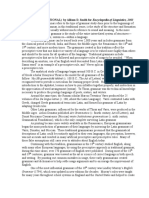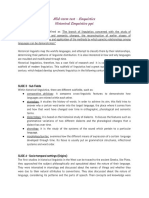0 ratings0% found this document useful (0 votes)
Linguistics: 18 C Grammarians and Their Aims
Linguistics: 18 C Grammarians and Their Aims
Uploaded by
Rameen SheikhThe 18th century grammarians aimed to codify the rules of English grammar based on Greek and Latin principles. They sought to establish rules for syntax, morphology, and phonology. While earlier grammarians recognized English differed from Latin, 18th century grammarians still applied Latin rules to English, such as prohibiting splitting infinitives. Their goals were to establish a standardized system of rules for English, resolve disputes over usage, and identify and correct perceived errors in the language.
Copyright:
© All Rights Reserved
Available Formats
Download as PPTX, PDF, TXT or read online from Scribd
Download as pptx, pdf, or txt
Linguistics: 18 C Grammarians and Their Aims
Linguistics: 18 C Grammarians and Their Aims
Uploaded by
Rameen Sheikh0 ratings0% found this document useful (0 votes)
The 18th century grammarians aimed to codify the rules of English grammar based on Greek and Latin principles. They sought to establish rules for syntax, morphology, and phonology. While earlier grammarians recognized English differed from Latin, 18th century grammarians still applied Latin rules to English, such as prohibiting splitting infinitives. Their goals were to establish a standardized system of rules for English, resolve disputes over usage, and identify and correct perceived errors in the language.
Original Description:
Linguistic
Original Title
Grammar Work
Copyright
© © All Rights Reserved
Available Formats
PPTX, PDF, TXT or read online from Scribd
Share this document
Did you find this document useful?
Is this content inappropriate?
The 18th century grammarians aimed to codify the rules of English grammar based on Greek and Latin principles. They sought to establish rules for syntax, morphology, and phonology. While earlier grammarians recognized English differed from Latin, 18th century grammarians still applied Latin rules to English, such as prohibiting splitting infinitives. Their goals were to establish a standardized system of rules for English, resolve disputes over usage, and identify and correct perceived errors in the language.
Copyright:
© All Rights Reserved
Available Formats
Download as PPTX, PDF, TXT or read online from Scribd
Download as pptx, pdf, or txt
0 ratings0% found this document useful (0 votes)
Linguistics: 18 C Grammarians and Their Aims
Linguistics: 18 C Grammarians and Their Aims
Uploaded by
Rameen SheikhThe 18th century grammarians aimed to codify the rules of English grammar based on Greek and Latin principles. They sought to establish rules for syntax, morphology, and phonology. While earlier grammarians recognized English differed from Latin, 18th century grammarians still applied Latin rules to English, such as prohibiting splitting infinitives. Their goals were to establish a standardized system of rules for English, resolve disputes over usage, and identify and correct perceived errors in the language.
Copyright:
© All Rights Reserved
Available Formats
Download as PPTX, PDF, TXT or read online from Scribd
Download as pptx, pdf, or txt
You are on page 1/ 6
Linguistics
18th C Grammarians and Their Aims
What is Grammar?
• Definition:
• Grammar is the system of rules which governs the production and use
of utterances in a given language. These rules apply to sound,as well
as meaning, and include componential subsets of rules, such as those
pertaining to phonology(the organization of phonetic sound
systems),morphology(the formation and composition of words), and
syntax(the formation and composition of phrases and sentences.)
18th Century
• This period is also known as “neo-classical” or “golden” age.
• It brought about major innovations and changes in English literature and
language due to the introduction of newspapers and literary magazines
as well as the innovation of novels.
• In 18th C, after the work of Dr. Johnson on vocabulary, the grammarians
were interested in syntax(sentence structure.)
• Treatises on English grammar began in 16th C and compiled in 17th C by
Ben Jonson and Milton.
• 18th C grammarians are Rhetoricians those who conveyed something to
the public. ”it is the art of public speaking”.
18th Century:
• They adopted Greek and Latin aspects and rules.
• Writers like John Wallis recognized that plan of Latin Grammar was
not well suited to exhibiting the structure of English, but not until 18th
C, English Grammar viewed as a subject deserving of study.
• They split infinitives in speaking English but Latin did not split it i.e.(to
see)He helped me to see became He helped to me see.(infinitive
splitting)
18th Centaury
• In Latin they did not end a sentence on preposition but people do it e.g. Where
do you come from?
• Once the Grammar is correct; the language can be fixed. Grammar is the only
thing that could be fixed with rules.
• They use Latin aspects.
• Another important aspect of 18 C was comparison. When you compare two
languages you will know the differences in Grammar.
• William Loughton, school master at Kensington; whose practical Grammar of
English tongue went through five editions, against those who have attempted to
force our grammar and goes so far as the discord the terms means adjective,
verb, substituting names, qualities and affirmations etc.
Aims of Grammarians:
• They aimed to do three things
• To codify the principles of the language and reduce it to rule.
• To settle disputed points and decide cases of divided usage.
• To point out common error in what were supposed errors and correct
and improve the language.
You might also like
- Berry, Margaret - An Introduction To Systemic Linguistics-ST. MARTIN's PRESS (1975)100% (1)Berry, Margaret - An Introduction To Systemic Linguistics-ST. MARTIN's PRESS (1975)219 pages
- English Grammatical History Has A Long Tradition Until The 17 CenturyNo ratings yetEnglish Grammatical History Has A Long Tradition Until The 17 Century1 page
- Lecture 7. New English Period: Cultural Events in The CountryNo ratings yetLecture 7. New English Period: Cultural Events in The Country9 pages
- A History of The English Language - SummaryNo ratings yetA History of The English Language - Summary5 pages
- Unit 8. Standardisation and PrescriptivismNo ratings yetUnit 8. Standardisation and Prescriptivism6 pages
- Lexicography: Its Basis Notions and Functions PlanNo ratings yetLexicography: Its Basis Notions and Functions Plan21 pages
- lexicography_05d9e3f6efe443c9b1424eb689fea619No ratings yetlexicography_05d9e3f6efe443c9b1424eb689fea6196 pages
- University of Texas Press Studies in English: This Content Downloaded From 109.91.36.77 On Sat, 30 Nov 2019 07:05:03 UTCNo ratings yetUniversity of Texas Press Studies in English: This Content Downloaded From 109.91.36.77 On Sat, 30 Nov 2019 07:05:03 UTC38 pages
- A Brief History of Early Developments in Language Teaching-Richards and Rodgers 2014 PDFNo ratings yetA Brief History of Early Developments in Language Teaching-Richards and Rodgers 2014 PDF17 pages
- Week+1+ELA+Explore+-+Language+Change+Revision+ListNo ratings yetWeek+1+ELA+Explore+-+Language+Change+Revision+List8 pages
- Lecture 15. Early Modern English PeriodNo ratings yetLecture 15. Early Modern English Period37 pages
- Unit 5. The Early Modern English Period (1500-1650)No ratings yetUnit 5. The Early Modern English Period (1500-1650)5 pages
- What Is The Difference Between English Literature and American Literature00No ratings yetWhat Is The Difference Between English Literature and American Literature003 pages
- KEY WORDS Grammar Prescription - Prescriptive Description - Descriptive LinguisticsNo ratings yetKEY WORDS Grammar Prescription - Prescriptive Description - Descriptive Linguistics10 pages
- ТЕОРЕТИЧНА ГРАМАТИКА АНГЛІЙСЬКОЇ МОВИ-3-11No ratings yetТЕОРЕТИЧНА ГРАМАТИКА АНГЛІЙСЬКОЇ МОВИ-3-119 pages
- Introduction to Regional and Dialect DictionariesNo ratings yetIntroduction to Regional and Dialect Dictionaries11 pages
- 507859[FREE PDF sample] (Ebook) Eighteenth-Century English: Ideology and Change (Studies in English Language) by Raymond Hickey (editor) ISBN 9780511781643 ebooks100% (4)507859[FREE PDF sample] (Ebook) Eighteenth-Century English: Ideology and Change (Studies in English Language) by Raymond Hickey (editor) ISBN 9780511781643 ebooks71 pages
- 1 LECTURE Subject Matter, Tasks, Types and ApproachesNo ratings yet1 LECTURE Subject Matter, Tasks, Types and Approaches21 pages
- Mid-Term Test - Linguistics Historical Linguistics100% (1)Mid-Term Test - Linguistics Historical Linguistics6 pages
- Western University: Introduction To LinguisticsNo ratings yetWestern University: Introduction To Linguistics29 pages
- A Biography of The English Language Early Modern EnglishNo ratings yetA Biography of The English Language Early Modern English6 pages
- The Lexicographer's Dilemma: The Evolution of 'Proper' English, from Shakespeare to South ParkFrom EverandThe Lexicographer's Dilemma: The Evolution of 'Proper' English, from Shakespeare to South Park4/5 (118)
- Interjections: Showing The Author's Emotion: Express Your Emotions List of InterjectionsNo ratings yetInterjections: Showing The Author's Emotion: Express Your Emotions List of Interjections3 pages
- Unit 1 Vocabulary: Present Simple &present ContinuousNo ratings yetUnit 1 Vocabulary: Present Simple &present Continuous7 pages
- Keynote Pre-Intermediate Contents (Word)No ratings yetKeynote Pre-Intermediate Contents (Word)5 pages
- HE'S ON HOLIDAY AT THE MOMENT - Present Simple and Present ContinuousNo ratings yetHE'S ON HOLIDAY AT THE MOMENT - Present Simple and Present Continuous2 pages
- I.E Signos de Fe La Salle Trujillo - Perú Inglés: Listen and ReadNo ratings yetI.E Signos de Fe La Salle Trujillo - Perú Inglés: Listen and Read2 pages
- Berry, Margaret - An Introduction To Systemic Linguistics-ST. MARTIN's PRESS (1975)Berry, Margaret - An Introduction To Systemic Linguistics-ST. MARTIN's PRESS (1975)
- English Grammatical History Has A Long Tradition Until The 17 CenturyEnglish Grammatical History Has A Long Tradition Until The 17 Century
- Lecture 7. New English Period: Cultural Events in The CountryLecture 7. New English Period: Cultural Events in The Country
- Lexicography: Its Basis Notions and Functions PlanLexicography: Its Basis Notions and Functions Plan
- University of Texas Press Studies in English: This Content Downloaded From 109.91.36.77 On Sat, 30 Nov 2019 07:05:03 UTCUniversity of Texas Press Studies in English: This Content Downloaded From 109.91.36.77 On Sat, 30 Nov 2019 07:05:03 UTC
- A Brief History of Early Developments in Language Teaching-Richards and Rodgers 2014 PDFA Brief History of Early Developments in Language Teaching-Richards and Rodgers 2014 PDF
- Week+1+ELA+Explore+-+Language+Change+Revision+ListWeek+1+ELA+Explore+-+Language+Change+Revision+List
- Unit 5. The Early Modern English Period (1500-1650)Unit 5. The Early Modern English Period (1500-1650)
- What Is The Difference Between English Literature and American Literature00What Is The Difference Between English Literature and American Literature00
- KEY WORDS Grammar Prescription - Prescriptive Description - Descriptive LinguisticsKEY WORDS Grammar Prescription - Prescriptive Description - Descriptive Linguistics
- 507859[FREE PDF sample] (Ebook) Eighteenth-Century English: Ideology and Change (Studies in English Language) by Raymond Hickey (editor) ISBN 9780511781643 ebooks507859[FREE PDF sample] (Ebook) Eighteenth-Century English: Ideology and Change (Studies in English Language) by Raymond Hickey (editor) ISBN 9780511781643 ebooks
- 1 LECTURE Subject Matter, Tasks, Types and Approaches1 LECTURE Subject Matter, Tasks, Types and Approaches
- Mid-Term Test - Linguistics Historical LinguisticsMid-Term Test - Linguistics Historical Linguistics
- A Biography of The English Language Early Modern EnglishA Biography of The English Language Early Modern English
- The Lexicographer's Dilemma: The Evolution of 'Proper' English, from Shakespeare to South ParkFrom EverandThe Lexicographer's Dilemma: The Evolution of 'Proper' English, from Shakespeare to South Park
- Inventing English: A Portable History of the LanguageFrom EverandInventing English: A Portable History of the Language
- Interjections: Showing The Author's Emotion: Express Your Emotions List of InterjectionsInterjections: Showing The Author's Emotion: Express Your Emotions List of Interjections
- Unit 1 Vocabulary: Present Simple &present ContinuousUnit 1 Vocabulary: Present Simple &present Continuous
- HE'S ON HOLIDAY AT THE MOMENT - Present Simple and Present ContinuousHE'S ON HOLIDAY AT THE MOMENT - Present Simple and Present Continuous
- I.E Signos de Fe La Salle Trujillo - Perú Inglés: Listen and ReadI.E Signos de Fe La Salle Trujillo - Perú Inglés: Listen and Read

























































































